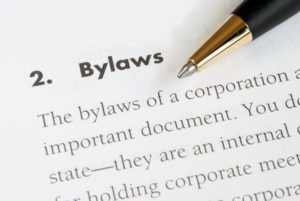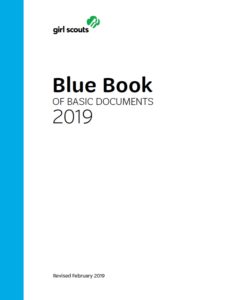If you’re a council delegate, it’s important that you to educate yourself on the types of governance documents that apply to your council in order to be an effective delegate and representative. There are a few that all delegates should be familiar with:
Bylaws
Your council’s bylaws are the most important document that you should know as a delegate. They are the basic rules and regulations created by a nonprofit organization in order to provide a framework for its governance structure. Some of the topics covered in a typical set of bylaws per Robert’s Rules include:
- Name of the organization
- Object or purpose
- Members
- Officers
- Meetings
- Executive board
- Committees
- Parliamentary authority
- Amendments
 Note that bylaws are different from organization to organization to meet their needs, so always consult your bylaws for any specifics. For example, amending the bylaws typically requires a 2/3rds majority vote of the membership, but this isn’t always the case depending on how your council’s bylaws read.
Note that bylaws are different from organization to organization to meet their needs, so always consult your bylaws for any specifics. For example, amending the bylaws typically requires a 2/3rds majority vote of the membership, but this isn’t always the case depending on how your council’s bylaws read.
Usually it’s required to submit bylaws to the office of your state’s Secretary of State (or the equivalent) as a part of a nonprofit’s obligations. Updated bylaws also have to be submitted to GSUSA per their charter. Organizations are legally bound by their bylaws, and they cannot be “overridden.” Failure to abide by bylaws puts an organization’s nonprofit status at risk, and it also puts a council’s charter with GSUSA in jeopardy. See this article for more information about finding out what to do if your council isn’t following its bylaws.
Where can you find your council’s bylaws? Ideally, they may be found on your council’s website and/or in materials distributed to volunteers by your council, but if this is not the case, then request them from your council. Don’t ever go to an annual meeting/delegate assembly of your council without them!
Articles of Incorporation
The Cornell Law website defines the Articles of Incorporation as:
…the highest governing document in a corporation. Also known as the corporate charter, it generally includes the purpose of the corporation, the type and number of shares, and the process of electing a board of directors. The articles of incorporation must be filed with the state at the time of incorporation, and may be amended or repealed as permitted by law and the articles themselves.
Your council’s Articles of Incorporation are filed to the Secretary of State’s office of your state. For councils whose jurisdiction covers more than one state, the Articles of Incorporation normally are filed in the state where your council’s main office is located. If you want a copy, you can usually request them via the office’s website. The IRS website can give you a good starting point to find your Secretary of State’s office. If you can’t find the Articles under your current council’s name, then it’s possible they might be filed under one of the legacy council’s names that made up your current council, and the current council would have been established under what’s called the Articles of Merger. They are very similar to the Articles of Incorporation, but they also include instructions on how the merging corporation’s or nonprofit’s business will be handled during and after the actual merger. Here’s a sample of what an Articles of Incorporation might look like.
Although some delegate body or the board of directors of your council likely adopted your Articles of Incorporation at some point in your council’s history, changing the Articles of Incorporation is normally a rare event. Nonetheless, it’s a good thing to be knowledgeable about what they are and what they do. Check your bylaws for specifics about the Articles.
 The Blue Book of Basic Documents
The Blue Book of Basic Documents
The Blue Book is the “bible” of Girl Scouts and contains our national governance documents including the Constitution, Bylaws, Credentials, Policies, Criteria & Standards, and the Congressional Charter. GSUSA releases new editions after each National Council Session and after changes as voted upon by the National Board. You can find a much more in-depth article about the Blue Book here on the GSG website.
Your state’s nonprofit corporation act
Each state has its own nonprofit corporation act which details the provisions and Code of Laws that all nonprofit organizations registered in that particular state must follow. Depending on your state, these laws may have more specific guidelines than what you would find in a typical set of bylaws, so if you are referencing your bylaws for something and can’t find it, your next source would be your state’s nonprofit corporation act. For example, you might want to know if you can get a copy of your council’s board of directors meeting minutes. The state nonprofit act could specify (but not necessarily) who can request them and how to do so. Your bylaws will also most likely have a clause referencing the act such as, “except as may be otherwise provided in the law of the State of [your state], the Articles of Incorporation, or these By-Laws.” Doing a basic Google search for “[your state] nonprofit corporation act” should bring up a link to it.
Happy reading!
